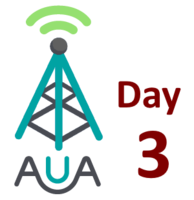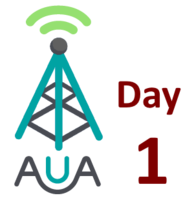AUA Telecoms Conference 2011 - Day 2
19 Jan 2011The second day of the 24th annual AUA Telecoms conference has come to a close and it was certainly a busy one with presentations from telecoms managers and suppliers on a wide range of topics. Some dry, some interesting and some that I’m sad to say I found interesting but would probably be some people’s idea of hell.
The day kicked off with a presentation from Bruce Everest of Vodafone. He presented around the topic of realising the benefits of total communication. This was taking a broad look at different measures and approaches to delivering a telecommunications solution in an organisation. The benefits of engaging champions and evangelists early in the process and setting out the benefits to be achieved from the start were common themes that appeared throughout the day. It was interesting to hear that in terms of user profiling of telecommunications use/requirements that there were four that kept appearing across many organisations (I’ve applied my own names to this):
- My Desker - has their own desk in our office and sits there each day.
- Hot Desker - has no desk but will find somewhere to sit each day in our office.
- No Desker - has no desk and will work from anywhere; a nomadic user
- Their Desker - has a desk somewhere else but not in our office; could be at home or some hosted location.
The presentation also mentioned about linking in with other services such as Skype and Linked In through gateways which in hindsight relates exactly to what I was expecting to see in the future of unified communications (as per my blog post from the first day of the conference). Maybe the future really has started today?
After a break out with the exhibitors Mick Thacker from the University of Central Lancashire was up with a case study that highlighted another familiar tale of a disconnect between the approach of ICT to deploy unified communications without the right level of engagement with colleagues in telecoms who by virtue of their roles and experience would expect to have critical skills and knowledge that need to be encompassed by any such project. I’m glad that for me telecommunications and computing solution are delivered by the same staff in a single small team so this simplifies thing considerably. But it does help me consider the implications of setting out communications and involvement strategies at the start of any significant technological undertaking. Mick was certainly one of the most engaging and entertaining presenters of the day.
Following Mick was Ricky Ricketts of BT Local Business. He covered a lot of similar ground to some other presentations in his update on how BT was supporting Higher Education. During his discussions around unified communications he passed comment that often it was being deployed without really understanding the business need it was addressing. This seems to be creeping in a great deal and really makes me want to get a better understanding of what issues unified communications is capable of addressing and what increase in capability it provides in tangibly.
There was an interesting point made with regards to presence during the presentation about what purpose it served. How many academics for example would really set themselves as available for contact when they had a few “spare” minutes and risk being inundated by half a year of eager undergraduates? I personally can see some benefits across practically any structure or organisation, but I think it will be the automatic elements presence. It is easy enough to bounce to voice mail if you’re in a call, but what about using GPS to know that you’ve left the building and so calls should forward to your mobile, or an RFID chip that triggers when you enter a lecture theatre to set your mobile on silent and change the out of contact message on your voice mail? Could we even get to the point when your phone knows how to deal with you walking into the cinema or an airport?
One thing I will remember from this presentation for a long time to come was from one of the delegates in response to managing pilot projects - “We’ve got more pilots than British Airways!””. There were a few nods around the room on this one.
The afternoon sessions kicked off with Stephen Butcher from HEFCE. Th presentation was focussed around the future of data centres and the carbon footprint. I had expected it to be more about best practice in terms of green ICT options for data centres. Instead it was a description of how HEFCE are looking to set-up a system of utilisation of under capacity data centres and the creation of shared services through a distributed / ‘cloud’ based data centre solution. It will be interesting to see how this progresses and what the uptake is from UK HE institutions in adopting this model. I think everyone agrees that it is a good / the only way to go, but the rate of adoption is going to be something to keep an eye on over the course of the next year.
Lynley Meyers from NetCall gave a view of how shifting channels of communication could result in cost savings. One of several presenters to reference the SOCITM information on the costs of contact through different channels it was pretty much a reinforcement of earlier material. I do wonder how much self service telephone services (particularly for students) might really be used in a few years time. My observation is that online services are used far more and whilst an SMS based service might be neat and accessible for the Y-generation, IVR is perhaps not the greatest innovation for these sorts of services to meet the needs of institutions in the coming decade.
The final break of the day gave way to a presentation by Graeme Roberts of the University of Liverpool on developing a telecommunications strategy. It wasn’t as in depth and focussed as I had initially expected, but instead gave an overview of how the development of a set of strategic points for the development of the telecommunications area gave rise to a number of structural changes in the area and how it was used to create an infrastructure development plan. It was an interesting case study and I was impressed at the scale of work carried out by such a small area. It has left me wondering just how big some of the other telecommunications departments are and what size and complexity of estate they are able to manage. I’m guessing that there must be a lot of third party contract work to do some of the bigger projects or that telecoms staff at Liverpool aren’t allowed to do other things like sleep ;)
The graveyard shift presentation was a brave choice. ‘Regulations and Legislation’ was consolidated and rattled through at a blinding pace by Dave Mailer of 4C Strategies. I have to admit in my own sad little geeky way that I had actually been looking forward to this one (as well as several of the others this day I might add) and I was not disappointed. Going way back to telegraph legislation through to the latest communication acts and then jumping around to cover things like WEEE directives, call recording and PCI compliance was crammed into just thirty minutes and at the end everyone looked to still be conscious and fully engaged. I’ve certainly got a few things I’ve managed to check off as ‘I knew I was right’ for my own ICT policy writing, but I’ve also identified a number of things I can pick up on and be even more explicit about which is exactly what I was hoping to get out of this particular session.
So at the end of the day I’ve been really pleased with everything I’ve picked up so far and I’m looking forward to tomorrow and in particular the presentation by Microsoft by Robin Chan on … you guessed it … Unified Communications!
Finally I should also add that for the evening meal I was very fortunate to be sat with the guys from Oxford University. Alan, Alistair and Adrian were great company and if you get the chance do ask about how the trials of trying to build a tunnel in Oxford can be resolved by building two wine cellars instead. Priceless.
 Scroll the menu to find all the places to visit
Scroll the menu to find all the places to visit


